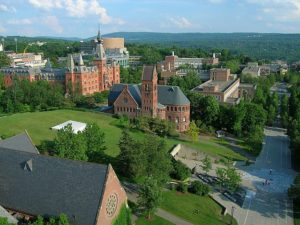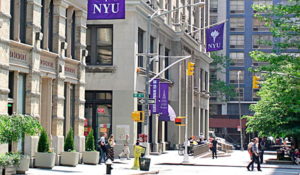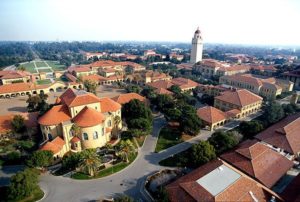Urban vs. Suburban vs. Rural Universities
Over the last couple of weeks, we’ve discussed the merits of traveling to the West or East Coast, staying in state or going out of state, or choosing a public or private school when selecting where to attend college. Today, we at CollegeVine have set out to discuss another important facet of the difficult process of choosing a school: whether to attend school in an urban, suburban, or rural setting. All three options offer significantly different experiences in terms of student life, extracurricular activities, and more. If you’re struggling to decide between attending school in a bustling city, a serene wilderness setting, or a quaint suburb, we’re here to help.
Rural
If you’re an outdoorsy person, then you should definitely consider attending school in a rural setting. Cornell University, for example, located in the small town of Ithaca in Upstate New York, features a gorgeous natural setting that offers students opportunities to engage with their surroundings in extracurricular, athletic, and recreational contexts. From hiking clubs to crew teams to a romp in the surrounding forest on a weekend, students with a penchant for exploring the great outdoors will thrive in at a school in a rural setting.
Another advantage of attending school in a more rural area is the lack of, or at least decreased number of distractions. For many students, those attending school in urban settings particularly, the temptation to eschew academic responsibilities for the exciting activities a city offers can jeopardize performance in school and wreck carefully-honed time management skills. A distraction-rich environment, when combined with the influx of freedom starting college provides, can pose a serious threat to productivity. For students who choose to attend school in a rural setting, the surroundings can actually be more conducive to a focused mind than anything; after all, don’t students often listen to nature sounds when trying to focus on an essay? The relative tranquility of attending college in a less developed area can become a huge blessing come finals season, when you’re not forced to choose between trying out that hip new restaurant that just opened downtown or hitting the books.
As a result of the slower social scene off campus, attending school in a more rural area can save you serious money. While of course frugality, whether you’re in the city or in the countryside, is largely a matter of personal discipline, you’re likely going to spend less money on average if you’re not surrounded by nightclubs, coffee shops, museums, events, plays, costly public transport, and more that makes living in the city, even as a student, a expensive endeavor. Not to mention that everything costs more in the city. If you don’t feel for spending your entire monthly food budget every time you crave a coffee to get you through a late night of studying, and you’d rather patronize on-campus cafes or dining halls, studying in a rural area might be the right choice for you.
Finally, also as a consequence of limited social and recreational offerings off-campus, schools located in more rural areas tend to both be larger in size and have a more closely-knit campus community. The dearth of things to do off-campus means there’s usually more going on on-campus to compensate, and campuses in more rural settings are usually bigger and sometimes feature more amenities due to an abundance of a space. For those seeking a large residential campus that’s almost like a city in itself and a tightly-knit campus community, a rural university is a smart pick.
Urban
Many of the advantages and disadvantages of urban universities are simply the inverse of their more rural counterparts. Don’t fancy yourself an outdoorsperson? You’ll never have to see a tree in its natural habitat again. Want to get off-campus whenever possible? There’s no shortage of things to do outside campus life if you’re attending school in a city.
Perhaps the most major advantage of attending school in the city is the opportunities it can provide. While this varies depending on exactly what city you’re attending school in, the heavy hitters like San Francisco, Los Angeles, New York, Boston, and Chicago all feature a wealth of employment, networking, and internship opportunities that can greatly enrich your academic and professional resumes. Not only does attending school in the city open up possibilities for spring internships, but also it provides possibilities for on-campus housing if you choose to get a summer internship, which can make the otherwise nightmarish process of finding housing a breeze. If you’re interested in community service, such as volunteering at a homeless shelter or teaching music or health classes to lower-income students, schools in cities often have a wealth of civic engagement programs to provide students with opportunities to help the less fortunate.
If you’re not worried about balancing work and play, living in the city as a young college student can also be the experience of a lifetime. Celebrity sightings, film premieres, cultural events, and more are a part of daily life for students who choose to study in major cities, and even smaller metro areas have world-class restaurants, museums, and landmarks that can spice up your weekends and provide a break from the pressures of school. Even if you’re hitting the town on a budget, most cities, especially those with a large student population like Boston, offer a variety of student discounts and promotions that can make going out more affordable.
One major drawback, or relative advantage (depending on your perspective), of urban college life is the degree to which going to school in a city can dissolve the typical tight-knit campus culture. Perhaps the most obvious example of this phenomenon is New York University, a school famous for not having a campus. NYU is host to smattering of buildings generally concentrated in New York City’s Greenwich Village, and student life more closely resembles that of an average NYC resident than a university student. However, the degree to which the city can take over campus life varies; another famous NYC school, Columbia University, features a pristine, traditional Ivy League campus with the same brick buildings and green lawns you’d find at Princeton or Yale. Inevitably, though, the influence of living in a city does impact student life to some extent, so if you value independence and seek to explore more than what your campus has to offer, an urban university may be right for you.
Suburban
In many ways, attending a school in the suburbs is the best of both worlds. Suburbs, especially college towns that have been built up and developed around a certain school, such as Palo Alto, CA (home to Stanford University) or Princeton, NJ (home to Princeton University) offer many of the amenities and opportunities of cities, without being exorbitantly expensive or sacrificing the quintessential campus lifestyle.
These compromises make college life in a suburb or small city appealing for many students. Many top universities are located in smaller cities near a major city, which allows for a more laid-back, slow paced everyday lifestyle but still affords opportunities for a night out in the big city or competitive internship opportunities. Some examples are Harvard University, which is located in Cambridge, MA, only 5 minutes or so outside Boston, and UC Berkeley, which is located in Berkeley, CA, just across the bay from San Francisco.
Many suburbs and small cities often feature neighborhoods surrounding colleges that are host to a wide array of restaurants, office supply stores, laundromats, boutiques, etc. that cater to the large student population. These neighborhoods and cities offer students opportunities to socialize off campus and essentially provide every amenity a college student could want. Can’t decide if you want a secluded college experience and a closely-knit campus community, or the excitement and opportunities of a city? A suburban college could be perfect for you!
Curious about your chances of acceptance to your dream school? Our free chancing engine takes into account your GPA, test scores, extracurriculars, and other data to predict your odds of acceptance at over 500 colleges across the U.S. We’ll also let you know how you stack up against other applicants and how you can improve your profile. Sign up for your free CollegeVine account today to get started!





